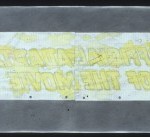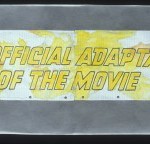Do you know anyone who remembers when they were a child and would paint or draw all the time but then also remembers the first time they drew on a wall and someone came and yelled at them?
Is this person you?
At some point in their lives, most people are taught that there are correct and incorrect ways of reacting to the world, but more importantly, people learn that if you are in a state of contentment, it is illogical to react at all, because any reaction might disturb the happiness. The logic is this: if I'm happy and make a drawing, someone might say it's bad and then I won't be happy, so I should just sit here. On the other hand, people seem to think that it is acceptable to react to the world by making art, writing, etc. if they are in a state of pain, because when you're in pain you have no choice except to react. This line of logic leads to many interesting arguments like why so many artists appear to participate in self-destructive behavior, why so many viewers assume all art is art therapy, or why “artist block” usually seems to stem from a place of contentment. I also think that many viewers have trouble relating to artwork that is not created from a state of pain, but simply as a reaction to something in the world. The fundamental questions many viewers will think while viewing work that is simply a reaction to the world is, “Why did you do this if you didn't have to? Don't you know you might be punished for it? This is a weird and illogical thing to do …”
Enter Craig Drennen's exhibition The Supergirl Project currently on display in Atlanta. In an artist's statement for a show in Samson Projects in 2004, Drennen wrote:
It has long been accepted that artists could stare at one spot in nature-whether it be Mt. Fuji, the Hudson River Landscape, or Mont St. Victoire-- to gather information around which to organize their work. I choose to stare at one spot in culture for my source of information. The “spot” at which I choose to stare is the 1984 movie Supergirl …
In other words, Drennen is simply using one element of the world to react to, which will inevitably lead some people to think that his work makes no sense or even worse, that it is some sort of a joke about a failed movie. Drennen's work is not mocking “Supergirl” at all, nor is it exalting the movie, Drennen is simply reactng to it because there many elements to react to. Drennen's reactions to “Supergirl” take the form of paintings, drawings, his artist statement, sound recordings, found objects, a nunchuck performance piece, interviews with himself and pretty much any other art form you can think of. Subsequently, the artwork encapsulates Drennen's reactions to many cultural elments including the ascendancy of film and video as cultural art production, fame, technological advancement and failure, strength of capital in production of meaning, reproducibility, painting, the Phantom Zone, gender roles, etc.
One of Drennen's main working methods is to produce multiples of an abstract object as well as rendering the back and front of an object. I find this working method makes perfect sense from Drennen's investigative perspective, but it simultaneously adds to the complexity of viewing the work. All of Drennen's work is either paired front and back renderings or a part of a multiple, which means that when viewing any one piece alone, it feels incomplete. Drennen's ability create work that can make multiple statements and to evoke a strange empathy for the incompleteness of an inanimate object is fascinating and can only really be felt in person, standing in front of the piece.
However, I relate more to Drennen's conceptual working method than any one single statement that his work makes because I don't think Drennen is trying to make any particular statement about culture, painting or anything else and I really don't think he is looking for any type of reward. I think he's just reacting to the world as everyone does, but he has no fear of punishment for what he makes.
I think Drennen's work should be shown to any artist who feels they have lost the creative spirit they had as a child because the point of Drennen's work is to realize that it is ok to just pick something and react to it without fear. I know I hope to emulate this working method within my own life and continue writing on the walls without fear.
 View an video interview with Craig Drennen View an video interview with Craig Drennenby Steve Aishman & Heidi Marston in a new window. |
Links:
Savannah College of Art and Design - Exhibitions
Samson Projects
Steve Aishman - Blogspot
"The Supergirl Project" is on view until June 15th at the Savannah Gallery, located at 3096 Roswell Road in Atlanta, GA
All images are courtesy of the artist, Samson Projects, and the Savannah Gallery.







